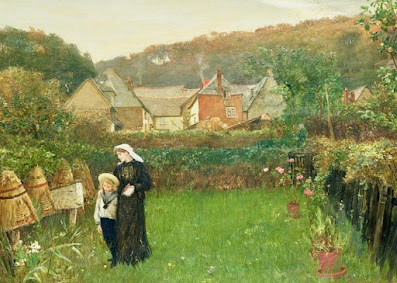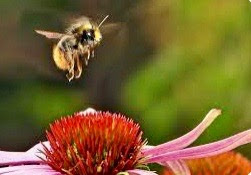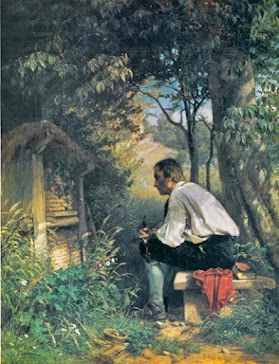By Mary Dodge Allen
Queen Elizabeth observing her bees. Andrew Milligan/PA Images/Getty
Shortly after Queen Elizabeth’s death in September 2022, John Chapple, the Queen’s royal beekeeper, performed the ritual of “Telling the Bees” – informing them of her death. He knocked softly on each of the many royal hives and spoke in a hushed voice, saying, “The mistress is dead, but don’t you go. Your new master Charles III will be a good master to you.” Then, in accordance with the mourning tradition, he hung a black ribbon bow on each hive.
Royal Beekeeper John Chapel, age 79, visiting the royal hives.
Roland Hoskins/ANL/Shutterstock
“Telling the Bees” goes back centuries and was first recorded in Molle’s Living Libraries in 1621. It is best known throughout the United Kingdom and Ireland, but it has also been recorded in Germany, France, the Netherlands, Switzerland and the United States. In years past, black mourning shrouds were draped over each hive, and in some cases, the news of a master’s death was softly sung to the bees, rather than spoken. Although this ritual was usually associated with funerals, it was also performed during happy events, like weddings or christenings. In Scotland in the 1950’s, an article in the Dundee Courier described the practice of decorating the hives on the day of a wedding and even leaving a slice of wedding cake near them.
Some historians think this ritual is tied to the old Celtic myths about honeybees - that they have great wisdom and act as a link between our world and the spirit world. It was believed that if you wanted to convey a message to someone who had died, you could tell the bees, and they would pass it on.
A woman in mourning visits beehives with her child. "The Widow"
artist Charles Napier Hemy, 1895
Royal Beekeeper John Chapple with a honeycomb. Simon Dawson/Bloomberg/Getty Images
Superstition aside, the relationship between honeybees and humans is based on mutual survival. Losing a beehive isn’t only about honey. Most of the crop species that feed 90% of human population depend on bees for pollination. Without bees, these crops wouldn’t continue growing, and the food chain would be disrupted - for animals that eat these crops, and humans who consume both crops and animals. It’s clear that honeybees and humans share a deep and vital connection.
Honeybee in the process of pollination. (Public Domain)
On April 27, 1956, the North Adams Transcript, a newspaper in North Adams, Massachusetts published an article covering the death and funeral of John Zepka, a longtime resident and avid beekeeper. It was widely known that John loved his honeybees and had a special relationship with them.
On the day of his funeral, people entered the mourning tent near his grave in St. Stanislaus cemetery and were surprised to find honeybees covering the tent ceiling and all the floral arrangements. The bees did nothing to alarm the attendees. They remained quiet and peaceful throughout John's service. Needless to say, everyone was astonished.
On March 3, 1961, an article in the Shrewsbury Chronicle, of Shrewsbury, Shropshire, England, described the strange phenomenon at the grave of Sam Rogers. He had been a local postman for forty-one years and had died suddenly only six weeks after his retirement.
Sam owned fourteen beehives and was known to be devoted to his honeybees. After his death, his children performed the ritual of “Telling the Bees.” Then, on the day of his memorial service at the local church, people noticed swarms of bees flying in from the direction of Sam’s house, a mile and a half away. The bees settled quietly on the flowers placed around his grave, completely covering them. Reverend J. C. Ayling and the entire congregation were amazed at the sight.
Even Mr. H. D. Pocock, chairman of the Shropshire Beekeeper’s Association, was surprised to see this behavior. He said bees are usually sluggish in March, and it was highly unusual for them to fly so great a distance at that time of year. By nightfall that day, the bees had flown back to their hives in the garden where Sam Rogers had lovingly tended them for so many years.
Sam owned fourteen beehives and was known to be devoted to his honeybees. After his death, his children performed the ritual of “Telling the Bees.” Then, on the day of his memorial service at the local church, people noticed swarms of bees flying in from the direction of Sam’s house, a mile and a half away. The bees settled quietly on the flowers placed around his grave, completely covering them. Reverend J. C. Ayling and the entire congregation were amazed at the sight.
Even Mr. H. D. Pocock, chairman of the Shropshire Beekeeper’s Association, was surprised to see this behavior. He said bees are usually sluggish in March, and it was highly unusual for them to fly so great a distance at that time of year. By nightfall that day, the bees had flown back to their hives in the garden where Sam Rogers had lovingly tended them for so many years.
"Der Bienenfreund" ("The Bee Friend") artist Hans Thoma, 1863
__________
PLEASE VISIT THE BLOG TO COMMENT ON THIS POST
Mary Dodge Allen is the winner of a 2022 Christian Indie Award, a 2022 Angel Book Award, and two Royal Palm Literary Awards (Florida Writer's Association). She and her husband live in Central Florida, where she has served as a volunteer with the local police department. Her childhood in Minnesota, land of 10,000 lakes, sparked her lifelong love of the outdoors. She has worked as a Teacher, Counselor and Social Worker. Her quirky sense of humor is energized by a passion for coffee and chocolate. She is a member of the Florida Writer's Association, American Christian Fiction Writers and Faith Hope and Love Christian Writers.
Website: www.marydodgeallen.com
Mary's novel: Hunt for a Hometown Killer won the 2022 Christian Indie Award, First Place - Mystery/Suspense; and the 2022 Angel Book Award - Mystery/Suspense.
Click the link below to buy Hunt for a Hometown Killer at Amazon.com:









Thank you for the fascinating post today. Very interesting!!
ReplyDeleteHi Connie, Yes, I found this interesting, too. I found many fascinating stories about honeybees and their beekeepers.
ReplyDeleteThat was my first thought..this is quite interesting. Thank you for posting.
ReplyDelete